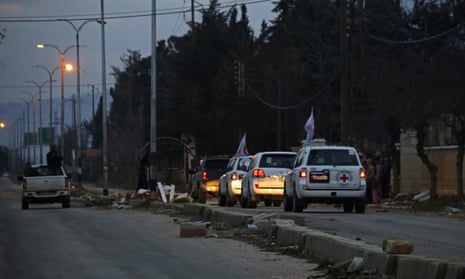A damning report has accused the United Nations of taking sides in the Syrian conflict and abandoning its neutrality by capitulating to the demands of the regime of Bashar al-Assad, including allowing it to veto aid deliveries to besieged areas.
The report urges the UN secretary general to set red lines for its humanitarian operations in Syria or withdraw its cooperation with the Assad government, saying the organisation’s failures have tarnished its legacy and enabled the regime’s brutal starvation sieges on opposition-held territory.
“There has been a systematic failure in the UN-led response,” said Roger Hearn, the former head of the UN Relief and Works Agency in Damascus, who ran the organisation during the first year of the conflict.
The 54-page report is titled Taking Sides and was compiled by the Syria Campaign, a pro-opposition advocacy group. It is signed by over 50 Syrian civil society organisations and draws on interviews with current and former UN officials as well as Syrians in besieged areas and humanitarian workers.
The report accuses the UN of prioritising its cooperation with the Syrian government “at all costs”, allowing the diversion of billions of dollars of international aid to one side of the conflict and thus contributing to civilian deaths in besieged areas that have been denied access to food and medicine.
UN agencies have chosen not to jeopardise their operations in the country and risk having their officials’ visas cancelled after confrontations with regime officials, the report alleged. Instead of unifying to demand greater access they chose to comply with the government’s demands and refusal to permit deliveries of aid, the report said.
The result has been that the Assad government, which is prosecuting the sieges, has dictated which areas the UN can send aid to. In April this year, 88% of that aid went to territories controlled by the government, and in all of 2015, less than 1% of people in besieged areas received monthly food assistance from the UN.
The UN has been repeatedly criticised for failing to deliver aid to over a million Syrians under siege. In recent weeks it was turned away from the gates of Darayya, a suburb of Damascus that had been besieged for over three years. When a convoy was allowed earlier this month, it was followed by barrel bombs on the town.
Access to besieged areas was a condition of a truce brokered earlier this year by the US and Russia, but the Syrian government has continued to ignore requests for aid deliveries, humanitarian officials say. In 2015, three-quarters of UN aid delivery requests simply did not receive a response from the Syrian government.
The UN backed away from a threat to authorise airdrops into besieged territories, saying it would only do so if it received permission from the regime.
Opposition groups seized on the report’s findings, saying that the UN is colluding with Assad in his government’s enforcement of the sieges.
Labib al-Nahhas, a top official in the powerful militia Ahrar al-Sham, tweeted on Wednesday:
Report shows total bias of the #UN towards #Assad not only in their actions but also in inaccurate & misleading reporting to the SC.
— أبو عز الدين (@LabibAlNahhas) June 15, 2016
3/5 #Syria Facts: #Assad weaponised starvation, #UN helped sustain it. Outcome: 100s dead, #Assad regime in #Geneva pic.twitter.com/HI1ovPiIYc
— أبو عز الدين (@LabibAlNahhas) June 15, 2016
Stéphane Dujarric, the spokesman for the UN secretary general, admitted that the organisation had to cooperate with the Assad government but said accusations that its work lacked neutrality “discredits the work that so many of our humanitarian colleagues, mostly Syrians, are doing on the ground”.
“We have to work with the Syrian government,” Dujarric said at a briefing on Wednesday with reporters. “We have no choice. We’ve not been shy about saying when we’ve been denied permission. But, again, if permission is not granted and roadblocks are put in place, we … you know, humanitarian workers, whether it’s the UN, whether it’s Syrian Arab Red [Crescent], we do not shoot our way through checkpoints.
“We have never shied away from exposing the barriers, administrative and otherwise, that have been imposed on the UN – that doesn’t allow us to do what we want to do, which is to have free and unimpeded access to all the areas that are needed,” he added. “When supplies are taken out, when surgical supplies are taken out, we speak out. We’ve not been shy of speaking out.”
Dujarric said the ultimate solution to the humanitarian crisis in Syria was a re-engagement by both sides with efforts to reach a political deal to end the fighting.








